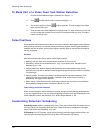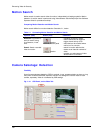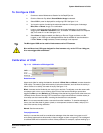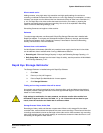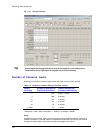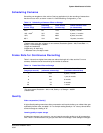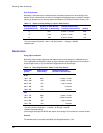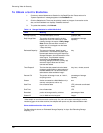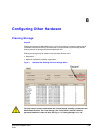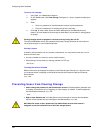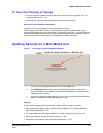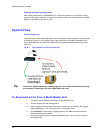
System Administrator’s Guide
Document K14392V1 Rev A 125
07/07
Scheduling Cameras
Scheduling can lengthen a video archive. One key application is for the recording of transactions
that do not occur 24/7, as shown in table 7–3. See Scheduling: Configuration, p. 105.
Table 7–3 Scheduling of Cameras: Effect on Storage
Recording
(hours / days)
Recording
Suspended (%)
Video Archive
(camera-day)
Oldest Available Video
(to closest date)
24/7* 0.0 1153 3 years, 1 month
12/5 + 24/2
†
35.7 1793 4 years, 11 months
12/7
‡
50.0 2306 6 years, 3 months
8/5 ** 76.2 4842 13 years, 3 months
* Default value: every day, all hours, for one camera, Resolution @ 320 × 240; Frame Rate = 1;
Quality = 8 and Storage = 500GB.
† Nights and weekends.
‡ Nights only; all week long.
** Business hours, five days a week.
Frame Rate for Continuous Recording
Table 7–4 shows how higher frame rates can reduce the length of a video archive. For more
cameras, divide the time of the archive by the number of cameras.
Table 7–4 Frame Rate: Effect on Storage
Frame Rate
(images per second)
Video Archive
(estimated, camera-day)
Oldest Available Video*
(rounded to shortest time)
1
†
1153 3 years, 1 month
2 576 1 year, 6 months
6 192 6 months
15 77 2 months
30 38 1 month
* For one camera; Resolution = 320 × 240; Quality = 8; Storage = 500GB.
† Default value
Quality
Video compression (“Quality”)
A higher Quality setting means less video compression and less time before your oldest video gets
replaced by fresher video; see table 7–5. For example: setting Quality to “10” uses up almost twice
as much storage as a setting of “6”.
Lowering quality to spare storage
At sites where storage is at a premium, you can lower the recording quality to six (6) compression
units. Table
7–5 shows that this can give you about 25% more storage—other settings unchanged.




